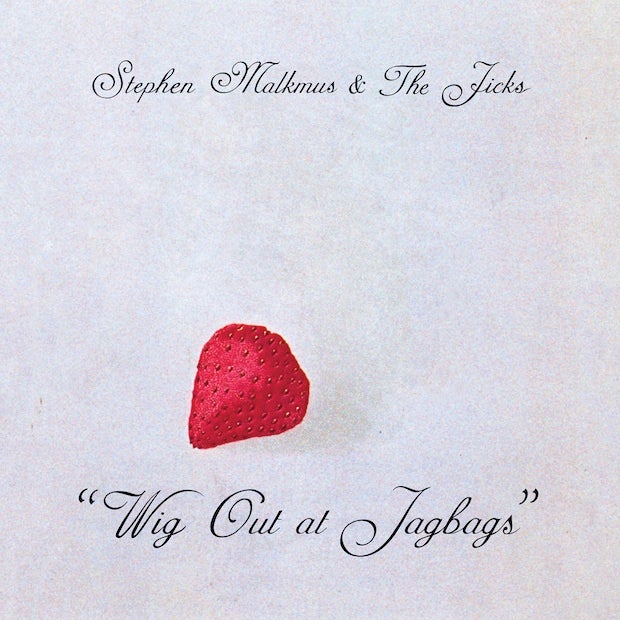Your support helps us to tell the story
From reproductive rights to climate change to Big Tech, The Independent is on the ground when the story is developing. Whether it's investigating the financials of Elon Musk's pro-Trump PAC or producing our latest documentary, 'The A Word', which shines a light on the American women fighting for reproductive rights, we know how important it is to parse out the facts from the messaging.
At such a critical moment in US history, we need reporters on the ground. Your donation allows us to keep sending journalists to speak to both sides of the story.
The Independent is trusted by Americans across the entire political spectrum. And unlike many other quality news outlets, we choose not to lock Americans out of our reporting and analysis with paywalls. We believe quality journalism should be available to everyone, paid for by those who can afford it.
Your support makes all the difference.Stephen Malkmus And The Jicks: "Wig Out at Jagbags" (Domino)
On 2011’s Mirror Traffic, Beck’s influence as producer tidied up Stephen Malkmus’s restless muse, resulting in his most approachable, melodically pleasing album in years. With Beck no longer at the desk, Wig Out at Jagbags finds him reverting to type, with wilfully obtuse sonic strategies that strive to wrong-foot even the most devoted listener, such as the rough-hewn, Bacharach-style “J Smoov”, whose clumsy-casual ambience sounds like a cardboard cut-out cabaret. Tracks like the stilted indie-prog opener “Planetary Motion” and stodgy “The Janitor Revealed” are needlessly complex when what’s needed is not another left-turn, but a better tune. The best one here is the single “Lariat”, a serpentine paean to “the music from the best decade ever” – which turns out, punningly, to be “the ADDs”.
**
Download: Lariat; J Smoov
Various Artists, "12 Years a Slave" (Columbia)
Overseen by John Legend, this soundtrack to Steve McQueen’s film mingles snatches of incidental music with intriguing performances by the likes of Gary Clark Jr and Alicia Keys. Clark does a sprightly fingerpicked version of the standard “Freight Train”, sung in high lonesome style, while Keys’ “Queen of the Field” is a lilting testament to a “life wasted pickin’, back broke from whippin’”. Elsewhere, Laura Mvula and Jason Rebello draw on “Good King Wenceslas” for the counterpoint melody to “Little Girl Blue”, while Legend himself offers a multi-tracked a cappella spiritual, “Roll Jordan Roll”. Most startling of all is Alabama Shakes’ jazz-blues “Driva Man”, a loping, sinister groove with jarring beats and Mingus-style horns behind Brittany Howard’s bitter vocal plaint.
****
Download: Driva Man; Freight Train; Queen of the Field; Roll Jordan Roll
Ed Harcourt, "Time of Dust" (CCCLX)
A mini-album presaging what Ed Harcourt calls an “album of evil songs” planned for later this year, Time of Dust is an alluring but unsettling record, which at its friendliest (“We All Went Down with the Ship”) sounds like a Coldplay dedicated to gloom rather than hope. But elsewhere it touches bare nerves: a subtle dread underscores “Come into My Dreamland”, where the sinister whine of theremin carries Harcourt’s silver-tongued entreat to suicide; while the cycling synth loops of “The Saddest Orchestra (It Only Plays For You)” embody the appeal of an ensemble “ever so sadly, ever so slightly out of tune”. Balanced by bitter barbs at modern snivellers and shysters in “Time of Dust” itself, the result is a compact but concentrated dose of poison.
****
Download: Come into My Dreamland; Time of Dust; The Saddest Orchestra (It Only Plays for You); Parliament of Rooks
Various Artists, "Stephen Ward: Original Cast Recording" (Decca)
Andrew Lloyd-Webber and Don Black’s musical about the Profumo scandal suffers from an excess of recitative – characters are always explaining the plot and, worse, themselves – and the need to stay true to early Sixties musical forms, which results in a lot of light-entertainment cheese; except for “Black Hearted Woman”, which derives from Seventies roots-reggae rather than the blue-beat appropriate to the era. Lyrically, the main business is done in “Human Sacrifice”, laying out the theme of corruption and scapegoat, and “Manipulation”, Stephen Ward’s comparison of his osteopathic duties with the wider manipulations of politicians. But rather than the Brecht/Weill feel appropriate to the subject, things lapse into a sort of camp version of Oliver! on tracks like “You’ve Never Had It So Good”.
**
Download: Human Sacrifice; Manipulation

Join our commenting forum
Join thought-provoking conversations, follow other Independent readers and see their replies
Comments